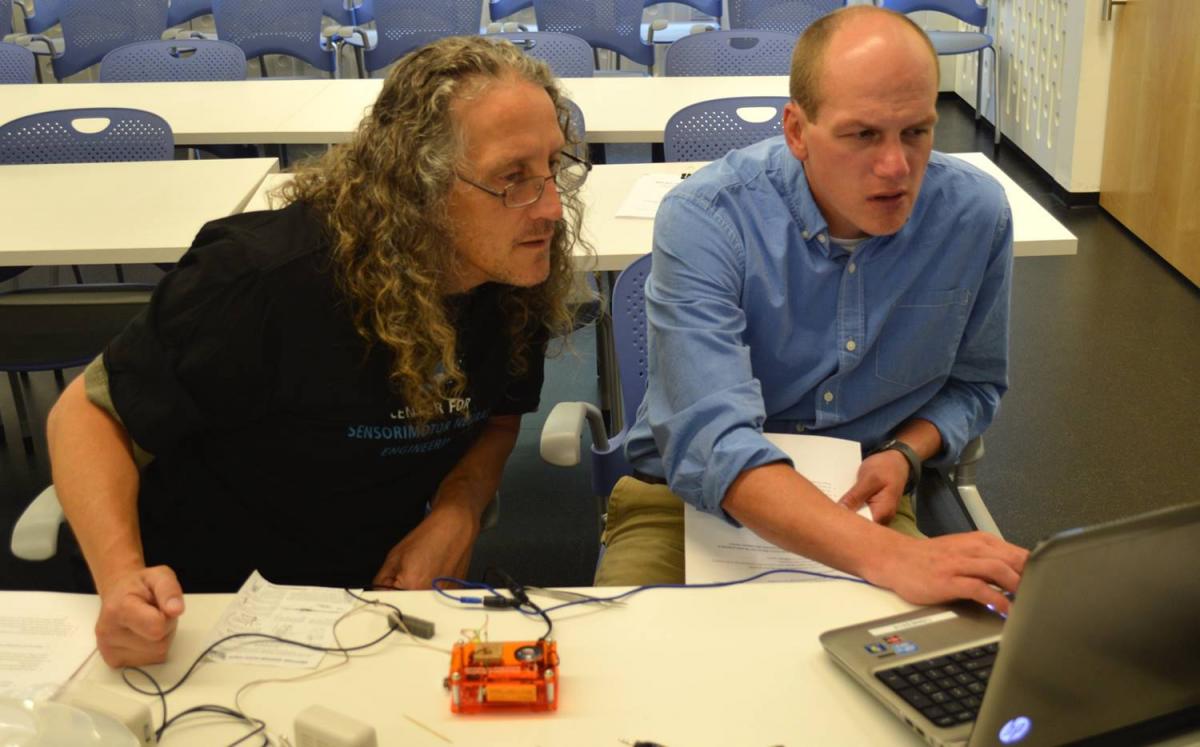 A career in education can be challenging, but it also has its perks. For middle and high school teachers, one benefit is having summers free for vacation and leisure time.
A career in education can be challenging, but it also has its perks. For middle and high school teachers, one benefit is having summers free for vacation and leisure time.
Paul Zimmer, who teaches chemistry at South Kitsap High School, opted for something else this year. He joined five other educators in a Research Experience for Teachers program at the Center for Sensorimotor Neural Engineering.
Over the course of seven weeks, Zimmer and his colleagues worked in labs at the University of Washington, developed lesson plans and created a final project that they’ll show off on Friday, August 14.
Being part of the program also meant that Zimmer has had 12-hour days instead of beloved free time. He lives in Port Orchard, Washington, with his wife and kids. And living there means it takes two ferries and a bus to get to Seattle; a one-way trip takes two hours.
He found out about the program through an email sent by the South Kitsap School District. “I was looking to try something new and incorporate some new information in my classroom,” he said. “I thought this would be a good way to do that.”
Zimmer described the program as “awesome” and challenging. He and Larry Bencivengo, who teaches biology at Mercer Island High School, worked in the UW BioRobotics Lab, where they were tasked with getting a haptic mouse—which means that you can feel when you move it or touch an object on the screen—to “talk” to a gaming program called Unity.
The end goal is to move the haptic mouse by using a keyboard, and then provide feedback to whoever is using the keyboard. Researchers in the BioRobotics lab eventually hope to use this technology to help people learn how to operate a brain-computer interface, providing sensory feedback to help them learn a task, like moving a cursor on a screen.
Zimmer said he’s looking forward to incorporating engineering into his chemistry classes. “There’s a whole array of science that a lot of kids aren’t exposed to,” he said. “When a student says, ‘I want to go into the medical field,’ there’s a wide range of what that entails. It’s not just the operating room any more. It’s also making devices used in medicine.”
Kristen Bergsman, who oversees the summer programs for teachers and high school students at the CSNE, said it’s more challenging to be a science teacher these days, due to new standards that require engineering to be incorporated into lesson plans. “It can be difficult to bring engineering concepts into a classroom,” she said. “I hope our program will help make it easier for Paul and other teachers to do that.”
Bencivengo—who coaches football, ultimate Frisbee and chess when he’s not in the classroom—said he’s learned more about working in academia this summer, and he’ll share that knowledge with his students. “I made a decision as an undergrad that I wasn’t really interested in academia,” he said.
“It has definitely been interesting to meet and talk with graduate students and researchers, and to see the little slice of life from that world. There are things about working in academia that are fun, seeing the excitement of learning about things, talking with other people about research and interests—even things like gaming—and all the opportunities, too. I didn’t realize how much was going on here at the University of Washington.”
Applications will be available in the fall for next year’s Research Experience for Teachers program. Check out lesson plans on neural engineering and traumatic brain injury for use in the classroom, and watch this page for more content in the months to come.
